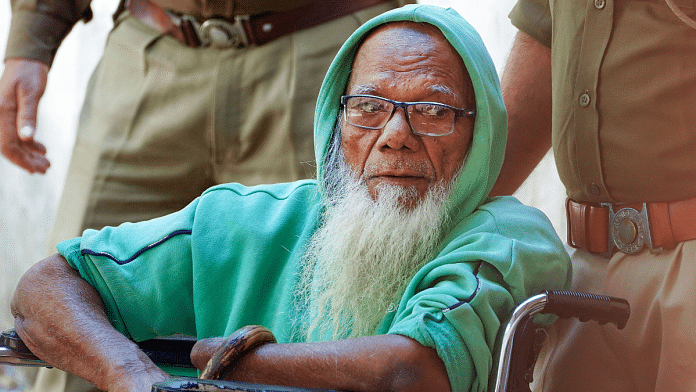New Delhi: Expert ‘bomb-maker’ Syed Abdul Karim ‘Tunda’ was acquitted by a TADA court in Rajasthan’s Ajmer for lack of evidence in the 1993 serial train blasts case.
The bomb blasts were planned on the intervening night of 5 and 6 December, coinciding with the first anniversary of the demolition of Babri mosque on 6 December 1992. Tunda along with two others were charged in the case.
The blasts in Lucknow, Kanpur, Surat, Hyderabad, and Mumbai had killed two people and injured over 20 people. Police had registered five cases in Kota, Valsad, Kanpur, Allahabad and Malka Giri which were later taken over by the Central Bureau of Investigation (CBI) and re-registered under the Terrorist and Disruptive Activities (Prevention) Act (TADA).
“Syed Abdul Karim is exonerated of all charges framed against him because allegations have not been proven beyond reasonable doubt,” the court order stated.
Tunda, a suspected aide of fugitive underworld don Dawood Ibrahim, will remain in jail serving life sentence for his role in the 1996 Sonipat blasts.
ThePrint traces the profile of Tunda and the chronology of cases leading up to his acquittal in the 1993 serial bomb blasts case.
Also Read: How CBI extradited Narender Singh, murder convict in 30-year-old case, from UAE
Tried luck in several trades
Tunda was born in a business family based at Old Delhi in 1943, but the family moved to Pilakhuwa in Uttar Pradesh’s Ghaziabad district where he started as a carpenter. He tried his hands in various businesses such as scrap dealing and cloth business, before getting indoctrinated by jihadis by the age of 40, sources in the Delhi Police.
Said to have lost one hand in an explosion, the ‘bomb expert’ was closely associated with the terror outfit Lashkar-e-Taiba (LeT). Although he had given up on his jihadi plans by 2005, Tunda kept supporting the Lashkar operatives by indoctrination.
The first case in which his name propped up as an accused was the one in which he was acquitted by the TADA court on Thursday.
The Special Cell of the Delhi Police, which arrested Tunda from the India-Nepal border in 2013, told a local court that 2024 that Tunda was involved in 33 terror cases between 1994 and 1998 — 22 in Delhi while the remaining 11 in Punjab, Haryana, Uttar Pradesh, and Rajasthan.
At that time, Special Commissioner of Police, S.N. Srivastava, who was heading the Delhi Police Special Cell, had said that Lashkar operatives had carried out 24 attacks in Delhi, five in Haryana and three explosions in Uttar Pradesh on his Tunda instructions.
The list of bomb explosions orchestrated by Tunda also included the one at Delhi’s Karol Bagh area and Sadar Bazar area in 1997, according to the police. One person was killed in Karol Bagh, while several others were left injured in the twin blasts at Sadar Bazar.
Cases against him
In 2015, a Delhi court had ordered his acquittal in three cases pertaining to Karol Bagh blast and Sadar Bazar area blasts. By 2016, Tunda got clean chits in all the four cases in which he was charge-sheeted by the Delhi Police’s Special Cell.
Tunda faced charges under the Explosive Substances Act and Sections 302 (murder) and 307 (attempt to murder) of IPC in the Karol Bagh blast case, and Sections 307 and 120B (criminal conspiracy) in the Sadar Bazar case.
His counsel had argued in the court that individuals who were named as co-accused in these cases were discharged and hence there wasn’t a genuine case against Tunda.
One year later, Tunda was also given a clean chit by a local court in the fourth and final case in which the Delhi Police’s Special Cell charge-sheeted him under Sections 121 (waging war against the country), 121 A (conspiring to commit certain offences against the state) and under provisions of the Explosives Substance Act, the Foreigners Act and the Arms Act.
In 2023, a lower court in Haryana’s Rohtak had discharged Tunda from cases related to twin blasts in the district in 1997.
Rohtak was rocked by two blasts in a span of half an hour in which the first explosion took place at the vegetable market followed by the second at Qila Road. There were no casualties but several individuals were left injured. The Haryana Police had booked Tunda and produced a total of 42 witnesses, including 27 police personnel.
Meanwhile, Tunda remained in the Ajmer central jail as a court convicted and sentenced him in the 1996 twin blasts case in Haryana’s Sonipat district.
In 2017, the court had sentenced Tunda for life in which the police had booked him under Sections 307 and 120B of IPC, and Section 3 of the Explosive Substances Act.
(Edited by Tony Rai)



